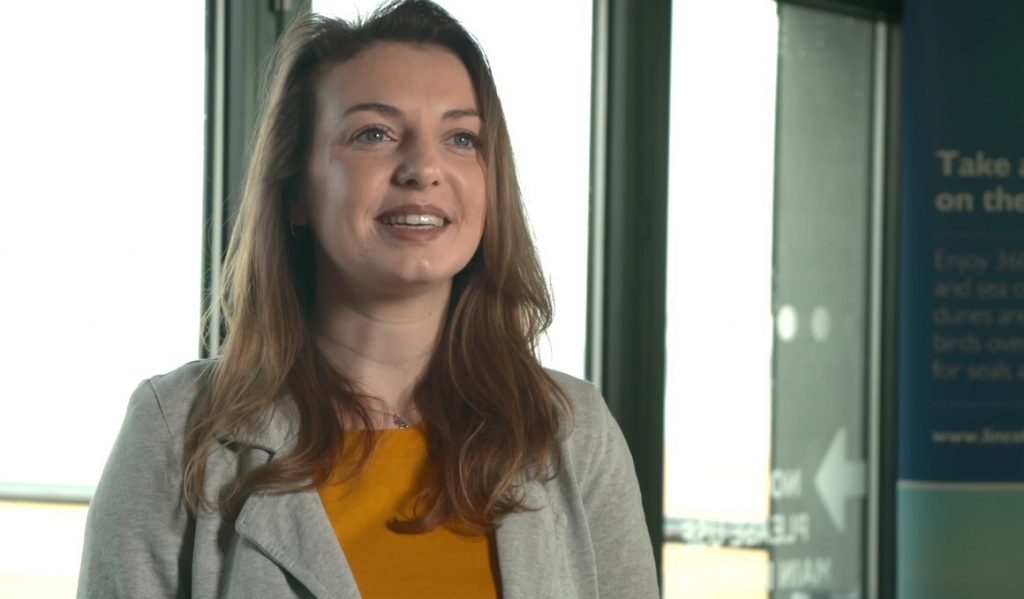
What is your current position?
I am an Offshore Consent Manager, currently for the Triton Knoll Offshore Wind Farm. I am responsible for ensuring that the relevant licences and consents are in place to allow construction of all elements of the wind farm that are in the marine environment. Environmental licenses are needed to ensure we build the wind farm in such a way that the local environment- fauna and flora – are protected at minimum to the levels set out in legislation and regulations.
What’s your typical working day like as an offshore consents manager:
Regular meetings with colleagues who manage different packages of engineering works are crucial to ensure that the project design and programme sits within what our consents permit. I also have regular updates with the government and private bodies responsible for regulating the marine environment to ensure the project is on track for discharging all of the relevant requirements prior to construction commencing. A major part of my role is the production of environmental and archaeological reports to satisfy the pre-construction requirements within the project’s consents. This involves the management of a number of specialist consultants who carry out the assessments in the field and submit their reports to me.
What studies have been most important in getting you into this post?
Geography was my favourite subject at school and a key subject for my path to becoming a Consent Manager.
How did you get here? Describe your career pathway in a nutshell:
After finishing my A-levels I studied BSc Geography and went on to complete a Masters degree in Coastal and Marine Resource Management at the University of Portsmouth. I first became interested in the renewable energy sector as part of my Degree and focused my final year project on public perceptions of an offshore wind farm. I wanted to be able to make a contribution to securing clean energy sources, to improve energy efficiency, and reduce emissions for the future. Knowing that this was a route I would be interested in exploring I was very pleased when my first job was at a company specialising in supporting the offshore wind industry. Following University I worked for an environmental consultancy for three years, before taking some time off to travel through South East Asia.
On my return to the UK I started a new role at a small renewable energy developer working on the consenting for a tidal lagoon project. I stayed there for 18 months before I joined Innogy in my current position.
How old were you when you started your first fulltime job in renewable energy?
I studied at university for a total of four years, so I was 22 when I started my first professional job at an environmental consultancy. The company I worked for specialised in providing advice to offshore wind projects on environmental assessments, surveys and reporting.
Why did you choose to work in renewables?
I feel like I can make a real difference with my work in renewables and contribute to tackle climate change. I chose the offshore industry in particular because we still have a lot to learn about the marine environment and the interaction with offshore wind technology. The techniques for marine survey and data analysis, and the subsequent environmental impact assessment, are continuously changing as we discover new things and I thrive on working in such an innovative environment.
Every day is different in my role and full of new challenges. I interface with the wider project team and have the opportunity to interact and learn from a range of people working in differing roles.
What is your proudest achievement in your role?
Where Triton Knoll’s offshore export cable makes landfall a Horizontal Directional Drill was required underneath a popular beach to minimise any impact. I was part of the team responsible for ensuring that all of the licences were in place and pre-construction requirements discharged before the work could go ahead. This was the first offshore construction activity and it was a great feeling to have successfully secured all the necessary permissions in time for the works to go ahead.
How many offshore wind projects have you worked at before Triton Knoll?
During my time in consultancy I worked across 4 or 5 different offshore wind projects which were in the application phase, coordinating their initial application for development consent. Triton Knoll already had consent when I joined and it’s the first time I’ve worked on a project going into the construction phase.
What would be your most important careers advice?
Start to get work experience as early as possible during your studies. The practical experience helps to make a more informed decision about the start of your career and will help set you apart from other candidates during the interview process.
